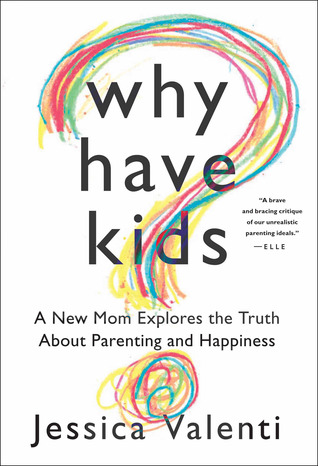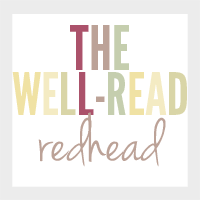Title: Why Have Kids?: A New Mom Explores The Truth About Parenting and Happiness
Author: Jessica Valenti
Publisher: New Harvest
Publication Date: September 4, 2012
Source: personal purchase
Plot Summary from Goodreads:
If parenting is making Americans unhappy, if it’s impossible to “have it all,” if people don’t have the economic, social, or political structures needed to support child rearing, then why do it? And why are anxious new parents flocking to every Tiger Mother and Bébé-raiser for advice on how to raise kids?
In Why Have Kids?, Valenti explores these controversial questions through on-the-ground reporting, startling new research, and her own unique experiences as a mom. She moves beyond the black and white “mommy wars” over natural parenting, discipline, and work-life balance to explore a more nuanced reality: one filled with ambivalence, joy, guilt, and exhaustion.
Would-be parents must navigate the decision to have children amidst a daunting combination of cultural expectations and hard facts. And new parents find themselves struggling to reconcile their elation with the often exhausting, confusing, and expensive business of child care. When researchers for a 2010 Pew study asked parents why they decided to have their first child, nearly 90 percent answered, for “the joy of having children.” Yet nearly every study in the last ten years shows a marked decline in the life satisfaction of those with kids. Valenti explores this disconnect between parents’ hopes and the day-to-day reality of raising children—revealing all the ways mothers and fathers are quietly struggling. A must-read for parents as well as those considering starting a family, Why Have Kids? is an explosive addition to the conversation about modern parenthood.
My Review:
I heard about this book when it was first released last year, and it stuck out in my mind because I remembered many media outlets commenting on the "controversial" nature of its contents. As a new-ish mom myself, I couldn't help but wonder what Valenti was touching on that could be getting so many people's backs up. I bought myself a copy for Christmas, finally got around to it--and now I understand the hype, though I wouldn't say it's anything unique to the world of parenting discussion topics.
Valenti's central question is, why do people choose to have kids, especially when so much research shows that parents are, on the whole, not as happy as adults without kids? And if parenthood is making so many people unhappy--why? Can that be changed?
From the first page, Valenti had my wheels turning--if nothing else, this book is thought-provoking from cover to cover. I think I did more Kindle highlights in this text than any other book, ever. I'm tempted to go through her book point-by-point and analyze it for you, but I'll spare you the diatribes. My bottom line on it is this: Valenti has gathered some interesting research for sure. She touches on a variety of hot-button issues, such as whether it's better to be a working mom or a stay-at-home mom, whether it's fair to say that parenting is really the "hardest job in the world", and if breastfeeding really is "best". (I know, do you smell blood in the water, or what?) Valenti relies on many scientific studies in her discussions of these issues, which is helpful--if I wanted a blanket criticism of stay-at-home moms, I can jump on pretty much any mom blog/chat forum and have a field day.
However, the problem I had with this book is that Valenti is completely and undoubtedly biased, one way or the other, on each issue she mentions. As such, the research she draws upon for many of her conclusions are primarily from studies that support her opinions. Yes, she will cite a few contrary studies here and there, but her tone in writing is so skewed that you can tell she gave those alternate viewpoints short shrift. (And this is coming from someone who agreed with many of her biases--hello, one of my favorite quotes from the book has got to be "Hell hath no fury like La Leche League scorned.")
Because of this, I found myself alternately loving this book, and feeling annoyed by it. I wanted to be able to take it seriously as an unbiased discussion of these issues, especially because, in the end, she does make some strong points about how we can make parenting better. But Valenti's obvious preferences prevented me from fully doing that. Prime example: at the end of her discussion on working vs. stay at home moms, she essentially finishes by stating, "I hate to say one of these is better than the other...but heck, I'm going to say it anyway" before she gives her (not entirely empirically-supported) opinion on why working moms are better off. That was a head-scratcher.
However, the book did make me think more critically about these topics than the usual mom blog or thebump.com forum would, which I appreciate. Her final points (like encouraging us to raise our children in a community, do away with the idea of "natural" parenting, and support each other in our parenting efforts) are absolutely worth putting into practice. And the flame-worthy factor of her opinions made for interesting brain candy, at least.
Overall, I'd say this book is a shining example of why the "mommy wars" exist in the first place. It's nearly impossible to have a discussion on these issues without letting your bias show through. I appreciate that Valenti tried to back her opinions up with some research, but I wish she had made a better effort to show both sides of the coin. Even so, if you're a parent (or thinking of becoming one) and want a quick, thought-provoking read, I'd recommend it.









Oh, interesting topic! I haven't read it, but I've read a lot of articles and studies about this, so I wonder if part of the "unhappiness" aspect of parenting can be attributed to the social stigma of NOT having kids. A lot of people have kids because that's what is socially acceptable, so of course they are less happy - meaning it's not that parenting makes them unhappy but rather their decision to give in to societal pressures.
ReplyI'm going to have to read this one so that I have a better understanding - thanks for sharing!
She discusses this idea quite a bit, especially the fact that a lot of people choose to have kids because they think the kids will make them happy...which puts a lot of pressure on the children and the parenting relationship itself. It's an interesting idea and I definitely think I know some people in that category!
As someone who plans on having kids, but is just not ready (even though 30 is creeping closer every day), this book really validated so many of my feelings and made me feel like I wasn't the lonely island I've often felt like. I totally agree with the fact that her clear bias was coming through, but like you said, this is a pretty hot button topic that is hard to take a middle stance on. I definitely think it's worth reading for all of the thought provoking topics she brings up, many of which I had never thought of.
ReplyI hope her book didn't scare you away! :) But I think it's a great thing for soon-to-be parents to read, because it makes you consider the reasoning behind your decision, and perhaps think a little smarter about some of your parenting decisions as well. You just have to be able to wade through her personal leanings.
Thanks for the review. I've been curious about this book even though I probably won't read it. How other people choose to raise their children isn't any of my business, and I don't particularly care what other people think about my parenting choices either (I appreciate input without judgments). I loathe books that fan the "parenting war" flames, whether intentionally or unintentionally.
ReplyI agree re: appreciating input without judgement. I think this book would have been great if she moved away from the judgemental tone a little more. I'm all for reading research on parenting techniques that are different than mine, but I don't necessarily want to be told that they are better/worse than what I'm doing.
LOL I love that La Leche quote!!! ;) But I agree with misfortuneofknowing, I just hate the fanning of the flames, ugh.
ReplyHaha me too...and I was a breastfeeder. But that quote still killed me. :)
I'm currently not planning on having kids, but it's definitely still a question a think about. It's really too bad this isn't an unbiased view of the issue! It would be nice to have a truly informative, research based book on the topic.
ReplyI would love to hear opinions on this book from people who don't plan to have kids...it would definitely shed the material in a different light! But yes, hard to want to jump into it knowing that it has so many biases.
This sounds interesting, but at the same time I usually hate books like this! :) I only have two kids but they're both so different, and my early mom-ing was so different from friends/family that I get frustrated when people act like they have the "right" answer.
ReplyI guess it's good that her bias is clear, though, so people can take her opinions for what they're worth.
That's true, her agenda certainly isn't hidden, so if you read it expecting the skewed focus beforehand, it probably wouldn't be as surprising.
I don't think I'd be able to handle this one. Just thinking about the "Mommy Wars" raises my blood pressure. I don't even have kids yet!
ReplyHaha they raise mine too!! Parenting was so much simpler before Facebook, chat rooms, and Dr. Sears (I would imagine).
I guess it's good that people aren't automatically expected to become parents and if they don't there's something wrong with them, but it does seem silly to discuss this question as though there's one right answer for everybody. You can never know how happy or unhappy you would have been if life-changing decisions (your own or others' close to you) had been different.
ReplyI think that's what makes this issue so hard to discuss. Comparing parents and nonparents on the happiness scale is like apples and oranges. Even though parents can say "oh I remember what life was like before..." your worldview changes so much when you have kids, there's no real way to compare how your life would have been without them. And nonparents haven't experienced the other side. So no one really knows what they're "missing", kwim?